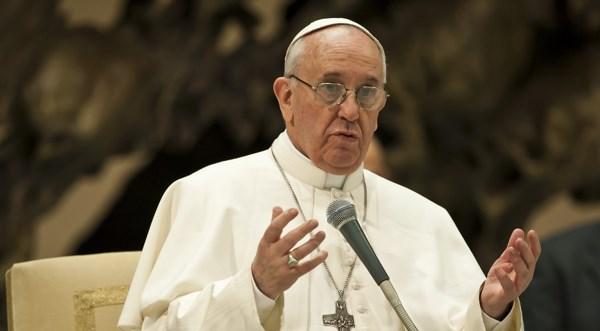In a letter ‘To the People of God’ this week, Pope Francis addressed the suffering caused by clerical abuse, expressing deep sorrow for the ‘heart-wrenching pain’ of victims and giving voice to the shame of the Church. James Hanvey SJ believes that, in trying to be attentive to the Spirit’s voice and presence, the pope’s letter marks a definitive moment from which there can be no turning back.
Pope Francis’ letter ‘To the People of God’ marks a definitive moment in the Church’s life. When placed alongside his letter in April to the Chilean bishops’ conference, it is an example of inspired leadership that has all the marks of his papacy: it is pastoral, practical, spiritual and prophetic. The pope decries ‘the deep wounds of pain’, in the victims and in the Church, arising from sexual abuse perpetrated by priests, bishops and cardinals, and asks for a profound transformation of hierarchical and presbyteral culture. This is a task that can only be accomplished by the whole People of God.
In recent months, the inexorable weight of suffering caused by abuse in the Church in all its forms has broken into the light. So too has the reality that the Church, whatever the motives, colluded with abusers to try to silence victims and hide the truth. How could any group in the Church ever think that protecting itself was of greater service to God than recognising the vast well of pain and destroyed lives – the lives of the innocent faithful? How could a Church defend the dignity of the human person and claim to be the advocate for the poor and powerless, the voice of the voiceless and the memory for the forgotten ones, when it was itself as adroit as any secular State in suppressing the cry of those it claimed to love and cherish? If the justification was to prevent scandal from undermining the faith of the People of God, who was being protected, the Church or the clerical caste? It is in this context, and with these questions legitimately being asked, that Pope Francis has written his letter to the People of God.
Some will think it just more pious words, understandably doubting if the call to penance and prayer is adequate given the enormity of the crisis and the depth of pain that it has caused and continues to cause. Yet, Francis has shown by his actions that he is not in the business of rhetoric. The letter hears the cry of the victims, too long muffled, silenced or denied, and speaks to the truth of clerical abuse in the Church, which must have been present even beyond the 70 years mapped by the Pennsylvania grand jury report. It would be a mistake to think that such abuse could be localised to America, Chile, the UK or Europe. The pope’s letter is not a political strategy, an admission of guilt in the hope that the issue can be defused, contained and forgotten once public attention is distracted by the next shock or event. Francis is not a politician; he is a servant of God and God’s Church. The Church, like those who have suffered abuse, cannot ‘just move on.’ The reality of abuse and its truth – always a deeply personal one - must erupt into the present and rupture it; it cannot be tamed or wrapped in words and consigned to history. To do so would be the greatest betrayal of all. The Spirit does not play politics or deal in deception and distraction. The coin of the Spirit is truth: the truth about God and the truth about us. Pope Francis has discerned that in the visibility and voice of those who are suffering, the Spirit is speaking. If we do not listen and then respond beyond the necessary protocols and legal instruments, the Church will miss the grace that is being offered. It will run the risk of making itself and its own survival an end in itself, succumbing to the temptation ofinstitutional idolatry.
In trying to be attentive to the Spirit’s voice and presence, I believe Francis’ letter marks a definitive moment from which there can be no turning back. The letter not only recognises the victims of clerical abuse and the culture that perpetuates it, it describes the desolation in which the Church lives because of it. Yet, the pope’s letter is not a letter of desolation it is one of consolation. The Spirit breathes through its pages.
The Spirit of witness
In the voices of all those who have been abused, the Spirit bears witness against the abusers and speaks for their victims. This is why the first response of the Church is not to rob them of their voice and their testimony. The first work of a Church genuine in its desire for conversion and repentance is to listen. This is often the hardest work of all. To analyse, categorise and bureaucratise the testimony of anyone who has been or is being abused is another act of violence. Their unique history is translated and retold in other narratives that they no longer control. Their voice is lost, their face made anonymous. If the Church really cares and sincerely desires to change, then it must listen to and honour each abused person. It must give space and time, for only then can it begin to hear, within the history of each person’s suffering, what has been taken from them and all those down the years who have been hidden.
Abuse is not just one moment or even multiple moments of violence, manipulation, deception and subjection. It enters the soul as well as the heart and mind. It is a rupture in the self and the fundamental sense of security on which identity depends. Abuse, even when buried, still has the power to hijack, destroy and undermine a life. It cannot be easily or conveniently ‘healed’ because the life of the person – their identity and confidence in themselves and their relationships – is always under threat. Often, in the case of clerical abuse, either the way in which the abuser has imposed their power or used the very formulas of faith to conceal and bind the person they are abusing, make the language of spirituality or the sacraments themselves sites of destructive memory and recall. This is why we must be very cautious about rushing to invoke such discourses as sources of understanding or promote them as strategies for recovery. The predatory abuser has already populated them, and they can be contaminated for the person who has been abused. Indeed, they may also be a symptom of the very clerical culture that has willingly or unwilling allowed abuse to remain possible.
The testimony of those who have been abused will now always be part of the Church’s identity. Their perseverance and courage is a kairos of conversion and renewal for the Church. The witness carried by the suffering of those who have been abused and their unmasking of its cause is certainly a source of desolation, but it is not disabling. It grounds the Church against the idolatry that places the institutional reputation before the lives of God’s people. Without this witness, the Church loses the truth that is the very freedom and joy of its life, the condition of its mission. The Church cannot guarantee its own existence or survival: it lives always from Christ and the life-giving Spirit. Only when it rejoices in its own poverty is it free to serve Christ and him alone.
The deepest threat to such freedom is fear: fear of acknowledging sin and corruption; fear of losing influence and security; fear of losing control and power. In all his writings, Francis highlights this temptation. This is why the Church needs to live constantly beyond itself in sacrifice and self-giving love for the life of the world. As Vatican II saw clearly in Lumen Gentium, this is not only the form of discipleship that shapes every Christian life, it is the form of the holiness to which we are all called, whatever direction our lives and relationships may take. It is especially the case for vocations to priesthood and religious life.
Clericalism pretends to protect the sacrament of priesthood; in fact, it instrumentalises it, placing it not at the disposal of God or the community but purely for the benefit of self. This is the great temptation of every gift of office, secular or ecclesial, and the only way of resisting it, is to seek to live with an interior knowledge of one’s own poverty, the habitus of humility and gratitude for the gift with which one has been entrusted. This is what is visible in the lives of so many priests and religious (women and men) spent in the ‘widows’ mite’ of mundane service. In this sense, conversion is not a sudden moment but a life-long process that requires prayer (in good times, bad times and boring times), honesty, humility, courage and faith. The deeper the love we have for Christ and the world created and redeemed in him, the more we will wish to remove whatever is an obstacle to him and his work. Under the dynamic power of this love, the Church will constantly ask the Spirit to renew and dilate its life that it may live more fully the semper maior of a cruciform love. This is the process that Francis has been speaking about in all of his writings and homilies. He understands that the Church is not just an institutional structure but one that is made up of people. If the structures are relationships and these relationships are to reflect the economy of God’s truth, mercy and love, then that economy must be rooted in the lives and relationships of all its members.
The Spirit of remembering and intercession
The Spirit is the one who calls all things to mind and in that act also intercedes. In ‘remembering’ the Holy Spirit takes our narrative and places it within that of Christ’s narrative, salvation history. As the psalmist says, ‘In your light we see light.’ The transpositional and interpretive work of the Spirit makes the reconciling and liberating grace of Christ accessible and active within the tortured history of humanity. In such a way the Spirit guarantees the ultimate justice of God, for no innocent suffering is ever lost or devalued, it is illuminated and shines in the darkness. In the crucified and risen Christ, the Church sees every victim and their wounds, and through the action of the Holy Spirit, every celebration of Eucharist is an anamnesis of him and them made present before us and in every moment that has gone before or still to come. It is, indeed, a dangerous memory for it subverts the strategies of the avoidance and suppression. It reverses the values of all the hierarchies of power and, as the letter of Pope Francis makes clear, the Lord shows us ‘on which side he stands.’ Whenever the priest who abuses celebrates the Eucharist he stands in this penetrating light which exposes all that is hidden; he encounters this Lord and in him the victims of his own abuse.
Through the epiclesis of the Spirit, the whole community is present both in witness and in intercession, for the Spirit is also the creator of this solidarity. Solidarity does not mean that we take on the guilt of the perpetrator but the suffering of the victims, resolving to hear their cry and seek justice for them; we become their advocates in prayer and in life. In this way, we can begin to experience the deep grace of the Church’s life and its hope: the real communio of the saints for whom intercession is a real work of repair. The faith-full community of Eucharist and intercession brings to the long, obscure and crooked road of history a healing and guiding light, already a sign that the Kingdom is present. We cannot love Christ unless we love his Church, no matter how disfigured and weak, yet never abandoned by the Spirit that dwells with the community and, like the Shekinah, fills it with a glory that will heal the world.
The Spirit of consolation and new life
There are no barriers for the Holy Spirit. Even the secular world that maintains that it has no place for God cannot be immune to the Spirit. It can even be the Spirit’s instrument. Is it not this secular world that has held the Church accountable when it could not do so for itself? Is it not the secular courts and agencies that have taught the Church the necessity of transparency, without which there can be no credibility? Through these institutes of the State, the Spirit is teaching the Church ‘to say an emphatic “no” to all forms of clericalism.’ The secular world, too, calls the Church to conversion: to be a Church it can trust and believe.
At the risk of some distorting generalisation, up to now the Church has relied on technical changes to deal with the abuse crisis: procedures, protocols, legal structures, etc. These are necessary, but they will not change a culture; they are the necessary signs of conversion, but they are not conversion itself. Indeed, they may become substitutes for it. The pope is engaged in something much more difficult: he is asking for the profound adaptive change that conversion requires. Such adaptive change is no threat to the essence and the truth of the Church; it recovers it.
Francis is asking us to go much further than safeguarding programmes, procedures and disciplinary structures, essential though they undoubtedly are. The pope, servant of the Council, recognises that we must renew ecclesial culture, creating a priesthood and episcopacy that are conformed to the sacrament upon which they are based. New structures will need to be developed that give this expression, embody justice and compassion, and protect all parties from falsehood and exploitation. These structures will need to reflect an effective subsidiarity within the life of the Church and an openness to expertise irrespective of gender or ecclesial status. The Spirit must be allowed to penetrate every aspect of the Church’s life and this will require a willingness to discern and learn from all sources. This is the adaptive change of conversion that embeds a new habitus. Such change is always the most difficult and painful. Often it will put those who advocate it or lead it at risk of rejection or scapegoating. It requires us to face the truth and not shift the blame; it obliges us not to short-circuit the process with ‘quick fixes’ to avoid pain or embarrassment. It moves us to another level of perception and understanding, to step out beyond what is familiar and comfortable, to let our minds and hearts be renewed until we begin to have ‘the mind of Christ’. This takes time; it requires the grace of fortitude and perseverance, but also faith in God’s people and the charisms that the Spirit has so richly bestowed upon them.
There will be many who wish to resist the adaptive change of conversion to which Pope Francis and those who have been abused are calling the Church. They may have convinced themselves that such change is not necessary, or that what is needed is some restorationist reform rather than an institutional metanoia. Yet, there can be no flight from the reality that now faces the Church. Those who think that they can restore the Church’s dignity or that of its priests by dressing in ever more extravagant vestments, confusing liturgy with theatre, thinking that God is somehow more attentive to a ‘sacred language’ than to the unadorned prayer of the anawim, risk being the guardians of an empty tomb. They are deaf to the words of the angel: ‘why do you seek the living among the dead?’ They have forgotten the common dress and language of the God who comes pro nobis, transcendent in his very poverty and simplicity; whose dignity lies in the washing of our feet.
The Risen Christ is not the prisoner of history but its Lord and saviour. A Church that confesses and follows him must understand that in order to be faithful to Christ in history, we must change ourselves in order to change history. This is the condition of the Church’s very existence and mission: to witness more clearly and effectively to the Lord who alone can heal and restore what is human in a world that is desperately trying to remember what the human is.
The pope’s letter is marking out the road we must take if we genuinely love the Church, the Body of Christ, and believe in her mission.
James Hanvey SJ is Master of Campion Hall, University of Oxford.






